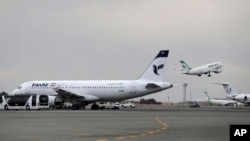Israel and the United States have responded with silence to claims by Hezbollah that the two allies secretly threatened Lebanon this month into stopping the arrivals of Iranian commercial airliners delivering cash to the Lebanese terror group.
The silence of the Israeli and U.S. governments on Hezbollah's allegations is typical of their low-key approaches to dealing with some regional security problems, according to U.S. and Israeli researchers who spoke to VOA in recent days.
The researchers also say Lebanon's indefinite suspension of landing rights for Iranian airlines, in effect since Feb. 13, will make it harder but not impossible for Iran to airlift cash to Hezbollah, its main regional proxy force.
Beirut began the suspension by calling it a "security" measure and denying landing rights to a scheduled flight that day of Iran's Mahan Air, whose passengers were left stranded in Tehran. Lebanese authorities initially said the halt to commercial flights from Iran would last five days but then extended it with no declared end date.
A day before the flight suspension began, the Israeli military posted a warning to the X social media platform, calling for a stop to Iran's elite military Quds Force using civilian planes to smuggle cash to Hezbollah via Beirut's airport. The warning said Israel "will use all available means" to ensure its security, as Hezbollah tries to refinance and rebuild from major losses sustained in a months-long Israeli offensive that ended with a November ceasefire. Iran's United Nations mission in New York did not respond when asked by VOA to comment on the Israeli warning.
In a recorded speech televised on Feb. 16, Hezbollah chief Naim Qassem said the Lebanese government had received a warning that Israel would attack the Beirut airport runway if the Mahan Air jet had been granted permission to land there. On Feb. 19, Hezbollah TV network Al Manar published a commentary that also blamed the flight's cancelation on "American bullying and threats," which it said included "U.S. financial and political sanctions" on Lebanon if the government did not agree to "limit" Hezbollah's freedom of movement.
In a conversation with reporters on Feb. 18, Lebanese President Jospeh Aoun said his government's measures against Iranian airlines "are linked to the sanctions imposed on them." Several Iranian airlines, including Mahan Air and Iran Air, are under U.S. and EU sanctions that prohibit transactions with those companies.
The Lebanese Embassy in Washington did not respond to a VOA request for comment on whether the government had received a warning that Israel would bomb Beirut's airport runway if the Mahan Air flight had landed there on Feb. 13.
The Israeli military also has declined to comment to VOA on whether it made such a threat.
The U.S. State Department did not respond to several VOA inquiries about whether it conveyed Israel's Feb. 12 warning to the Lebanese government through the U.S.-led ceasefire monitoring mechanism.
Israeli Brigadier General (Retired) Assaf Orion, a defense researcher at the Washington Institute for Near East Policy, said Israel did not have to publicize a specific threat against Beirut's airport to get its point across to Lebanon. He cited multiple Israeli strikes on Syria's main civilian airports in Damascus and Aleppo in October and November 2023.
The strikes, which left the Syrian airports temporarily inoperable, were part of a years-long Israeli military campaign to obstruct Iranian arms shipments to Hezbollah through Syria, then ruled by Iranian ally Bashar al-Assad.
"Look at Israel's track record at Damascus International Airport. Assad, before he fled Syria into exile in December, understood that if he wanted his airport to be operational, he needed to stop it from bringing in Iranian arms shipments," Orion said.
The U.S. also typically conveys warnings to Lebanon through a combination of private communications and public diplomacy rather than through issuing public threats, said former Israeli intelligence official Avi Melamed, who runs Inside the Middle East, a U.S. nonprofit research group.
U.S. Deputy Special Envoy for the Middle East Morgan Ortagus, in a visit to Lebanon on Feb. 7, told reporters that Hezbollah must be prevented from using any role in the Lebanese government to terrorize the Lebanese people, calling that a "red line" for Washington. She did not mention the possibility of any new sanctions on Lebanon.
U.S. Major General Jasper Jeffers, who arrived in Lebanon in November to lead the ceasefire monitoring mechanism, has said little publicly about his work. In a January 15 comment, the latest of three Jeffers statements published by the U.S. Embassy in Beirut, he commended the Lebanese Armed Forces' efforts in "providing for the security and stability of Lebanon."
The researchers said Iran's inability to fly its civilian planes to the Lebanese capital will complicate its longstanding efforts to deliver cash by air to Hezbollah.
Eyal Zisser, a Middle East history professor at Tel Aviv University, said Iran has alternative options of transporting cash on Iraqi and Turkish airliners that fly to Beirut.
"But if you are moving millions of dollars through Iraqi and Turkish airports, you would need cooperation from authorities of those countries," Zisser said. "Transferring the money from an Iranian plane to a Turkish plane at a Turkish airport would be a complicated process."
Delivering smaller amounts of cash on Iraqi and Turkish flights to Beirut would be relatively easier for Iran and harder for authorities of other nations to prove as illicit activity, according to David Daoud of the Washington-based Foundation for Defense of Democracies.
The Lebanese government began asserting more control over security at Beirut's airport last October, reducing the influence of Hezbollah as it was reeling from Israel's offensive.
But Daoud said Lebanon's decision to suspend flights only from Iran, rather than from other nations, shows that its tightening of security has been inconsistent.






